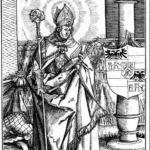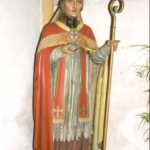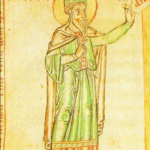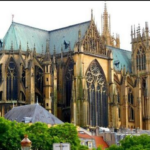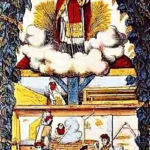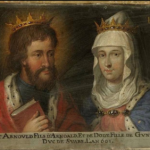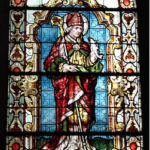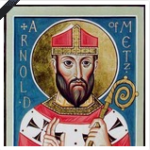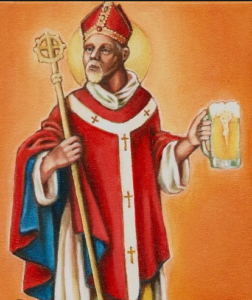
Saint Arnoul Bishop of Metz of Heristal
Date of Birth
August 13, 582
Place of Birth
Nancy, Lorraine, Frankish Kingdom
Towns / Cities Moved Into
-
Known Occupation
Mayor of the Palace of Austrasia,
29th Bishop of Metz,
Duke of Moselle,
Marquis of Antwerp,
monk,
mayor of the Palace of Austrasia,
Advisor to the Merovingian Court of Austrasia,
Senator
Religion
-
Spouse
Death Information
Year of death
August 16, 640
Place of death
Metz, New South Wales, Australia
Cause of death
-
Burial location
Remiremont Church of the Apostles, Metz, Austrasia, Lorraine, France
Obituary

Parents

King Arnoldus Of Saxony

Princess Berthe Dode Of The Franks
Marital Status


Married Oda De Savoy
-
Children



Narrative / Story
Saint Arnoul, Bishop of Metz, was born on August 13, 582, in the bustling town of Nancy, located in the heart of Lorraine, a region within the Frankish Kingdom. His birth into the family of King Arnoldus of Saxony and Princess Berthe Dode of the Franks bestowed upon him a heritage of nobility and prominence. This lineage set the stage for a life that would intertwine deeply with the political and religious tapestry of medieval Europe.
From an early age, Arnoul was destined for a path of influence and leadership. His noble birthright opened doors to prestigious positions, shaping his journey through the echelons of power and faith. He rose to become the Mayor of the Palace of Austrasia, a position that placed him at the epicenter of Frankish political life. His responsibilities extended beyond the secular realm as he took on the revered role of the 29th Bishop of Metz, further solidifying his influence in both the spiritual and temporal worlds.
Arnoul’s life was marked by a series of notable titles that reflected his multifaceted role in society. He was known as the Duke of Moselle and the Marquis of Antwerp, titles that spoke of his secular authority and territorial command. His devotion to religious life led him to embrace monasticism, a decision that highlighted his deep spiritual commitment amidst his worldly responsibilities.
In the complex and often turbulent world of Frankish politics, Arnoul served as an advisor to the Merovingian Court of Austrasia. His counsel was sought in matters of state and governance, reflecting his wisdom and experience. He also held the esteemed position of a senator, participating in the legislative processes of his time. These roles placed him at the forefront of the socio-political changes that were shaping the Frankish Kingdom.
Arnoul’s personal life was intricately linked with his public persona. He married Oda De Savoy, and their union brought forth children who would continue his legacy. Among them were Saint Chlodulf, Bishop of Metz, Ansegisel de Mets, and Walexhise, comte de Verdun. These offspring not only carried on his lineage but also played their roles in the unfolding narrative of medieval European history.
The era in which Arnoul lived was one of transformation and upheaval. The emerging feudal structures of the time were reshaping society, with power increasingly concentrated in the hands of the nobility. As a noble, Arnoul navigated these changes, wielding influence and managing lands in a period marked by shifting allegiances and occasional strife.
Arnoul’s life was not just a tale of power and influence; it was also a journey of faith and devotion. His decision to retire from his secular roles and dedicate himself to monastic life was a testament to his deep spiritual convictions. This transition from a public figure to a life of contemplation and prayer marked a significant chapter in his life, reflecting the complex interplay between faith and politics in medieval Europe.
The legacy of Saint Arnoul extends far beyond his lifetime. As a progenitor of the Carolingian dynasty, he laid the foundations for a lineage that would leave an indelible mark on European history. His descendants, including Charlemagne, would go on to shape the political and cultural landscape of the continent.
Saint Arnoul’s death on August 16, 640, in Metz, marked the end of an era. He was laid to rest in the Remiremont Church of the Apostles in Metz, Austrasia, Lorraine, France. His burial site became a symbol of his enduring legacy, a reminder of a life that played a pivotal role in the annals of European history.
Reflecting on the life of Saint Arnoul, Bishop of Metz, one is drawn into the narrative of a man who navigated the complexities of his time with wisdom and devotion. His story is not just a tale of power and influence but also a testament to the enduring impact of leadership and faith. His legacy continues to resonate, offering insights into the rich tapestry of medieval European history.
